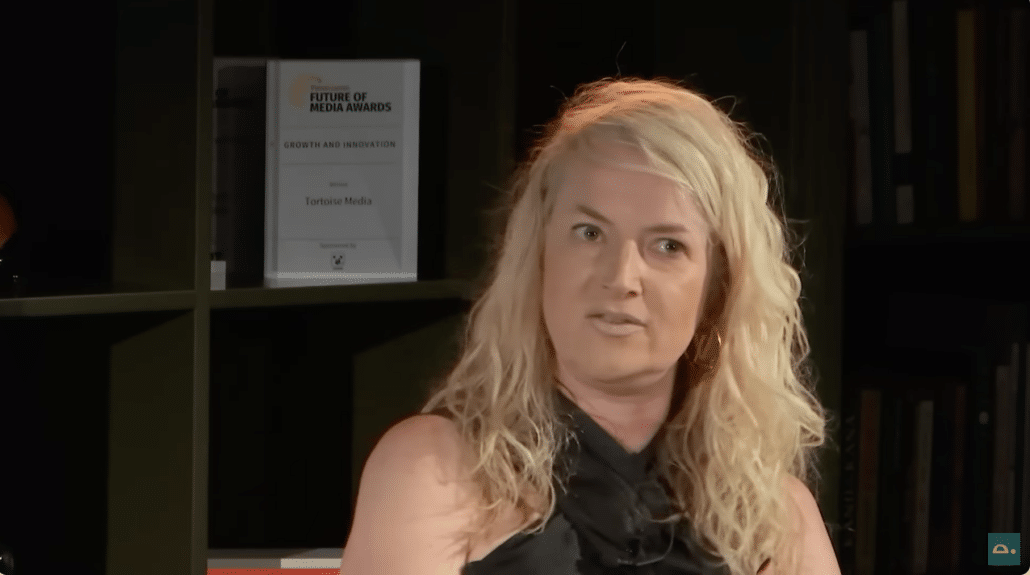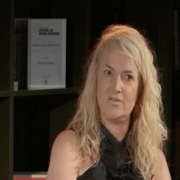Takeaways from Netflix Scoop: The Prince Andrew Interview
Newsnight’s Prince Andrew interview made headlines around the world and led to him stepping down from public life. The new Netflix drama-documentary about how the interview came about and the part played by Sam McAlister – documented in her book Scoops – is an excellent couple of hours entertainment. The book is also a good read but has little to say that is relevant to run of the mill media relations. McAlister was Newsnight’s interview booker who concentrated on high profile, hard to get interviewees. It is a very niche part of journalism. (McAlister is a very interesting speaker and there is a great long form interview with her here on YouTube.)

Sam McAlister former Newsnight booker and author of Scoops
A quick disclaimer first about the Netflix production. I am squeamish about the way a drama-documentary blends fact and fiction. And I have also always been squeamish about some aspects of investigative journalism which can resemble more of a hunting party than anything that might be called balanced reporting. But putting these aside, I do have a few Media Training observations from the film.
First, never underestimate a journalist’s need to get a story. Netflix’s Scoop very realistically portrays the pressure serious journalists are always under to ‘find something that people care about’. Britain selling arms to Saudi Arabia is dismissed as a Newsnight lead early in this film because ‘there is nothing new to say’. Brexit is dismissed because we are all bored with it. Prince Andrew accused of consorting with a sex offender (with implications of much worse) was also not new, but he is ‘a Royal’ and Epstein had just been arrested, and later just committed suicide. It was a juicy Royal story with a strong peg.
Second, this drama showed how people prepare for big important interviews. They role play. In this case both Prince Andrew and Emily Maitlis, the interviewer, were shown rehearsing for the interview. If you have a big interview to do, it is extremely valuable to role-play the scenario and learn the best lines.
Third, prepare for the open questions as well as the interrogation. Open questions lull people into a false sense of security. As the fictional Sam McAlister says ‘men like this, like to talk. Let him talk’. Maitlis is portrayed as taking McAlister’s advice at the last minute. By giving the interview a soft opening she set the tone for a ‘fireside chat’, where arguably more was revealed than would have been achieved with a ‘tough’ interview opening.
Finally, and most importantly, what this account highlights is that in any crisis interview the spokesperson must demonstrate understanding and sympathy for any victims. Despite a great deal of opportunity at the beginning and end of the interview, Prince Andrew never apologised, did not admit errors of judgement or mistakes, and did not show an ounce of understanding for the life of a trafficked sex worker. I remember this from the real interview. Prince Andrew came across as self-obsessed, unable to see what his actions looked like to others. He did not express horror or distaste at Epstein’s crimes or alleged crimes. Wording these apology and empathy statements can be difficult, but they are essential.
As the film shows, the Press Statement which announces that Prince Andrew is ‘stepping back’ from public life covers all those bases but by then, of course, it is too little, too late.
Image of Sam McAlister taken from YouTube
- What Crisis Spokespeople Can Learn from the Huntingdon Train Statement - November 5, 2025
- Waitrose Shows the Perils of Being Tone-Deaf in the Social Media Age - October 29, 2025
- A New Dawn (Again): Why Clichés Still Make Great Headlines - October 22, 2025




Leave a Reply
Want to join the discussion?Feel free to contribute!